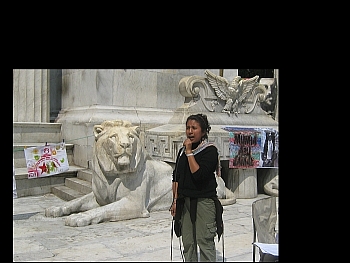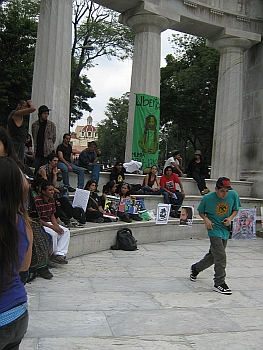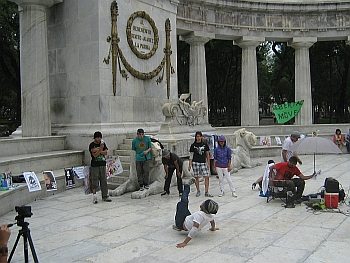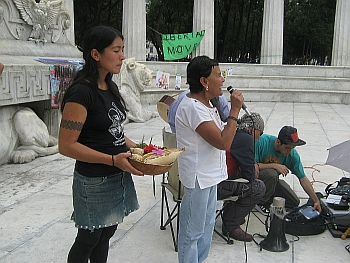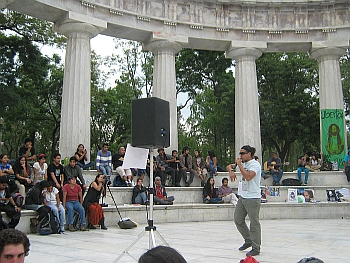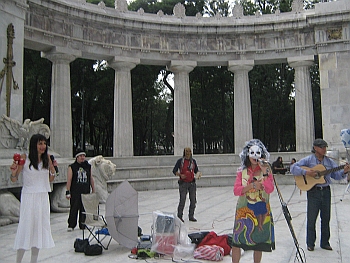Sept. 23, 2010 elnuevodia.com Por Daniel Rivera Vargas / drivera2@elnuevodia.com
English translation follows Spanish
Decidido a vivir el doble
Luis Rosa dice que es la única forma de recuperar
el tiempo perdido tras las rejas
El más joven de los ex presos políticos, Luis
Rosa, es un hombre simpático y expresivo.
El padre de tres hijos -Luis, Inara Tanairí y
Esaí Sebastián, los dos últimos del matrimonio
con la hermana del también ex preso político
Edwin Cortés- comienza a explorar la exportación
de productos a mercados agrícolas de Chicago,
donde pasó buena parte de su vida hasta su
arresto en 1980. Tiene 50 años de edad, pasó 19
años preso, es percusionista y obrero de la construcción sin empleo permanente.
¿A qué te dedicas?
Vivo en Aguadilla, estoy desempleado, soy
promotor de eventos culturales y trabajo en la construcción liviana.
¿Qué fue lo más que te impactó a tu salida de prisión?
Antes yo veía más campo, más gente orgullosa de
trabajar el campo, más ayuda en ese sector. Lo
que me impactó mucho es la siembra de cemento.
Entiendo que es necesario porque tiene que ver
con el desarrollo, pero perdimos ese sentido de
cultura, esa mancha de plátano se nos ha borrado
un poco cuando nos alejamos de la tierra. Creo
que ahora mismo hay un resurgir en la
agricultura. Yo estoy tratando de comenzar un
proyecto de exportación a Chicago.
¿En que etapa esta ese proyecto?
Ya he visitado un Farmer’s Market en Chicago.
Llevo la maleta llena de aguacates y pana, esta
semana llevo quenepas, piña y guineos. Maíz no
pude llevar. Muchacho, se pelearon por las panas
allí, en Chicago las panas cuestan $6 a $7 cada una.
¿A qué te refieres con promotor de eventos culturales?
Como parte del grupo "Por la libre" organizamos
un festival en Caguas celebrando el 30
aniversario del grupo Mapeyé, y luego el
concierto de Batacumbele en Carolina y antes de
eso, tan pronto salí celebramos un festival de 4
días que era el festival por la paz en Vieques.
Además, organizamos actividades de teatro y
bohemia en esta área (Aguadilla, Aguada), en
conjunto con la exposición "Sin espacio
suficiente". Además tenemos una obra para
presentarla pronto en Aguada con Sandra Rodríguez
que yo escribí, “Aquí está abuela con su ritmo
negro”. Es una respuesta a los resultados del
censo de 2002. Para Chicago hemos reclutado
talento para la fiesta boricua allá y un
concierto que vamos a hacer la segunda edición
que se llama Navijazz, con talento de aquí. Este
año es con Luis “Perico” Ortiz. También en la
lucha por Oscar (López, el único del grupo que no
ha sido excarcelado). Nuestra prioridad es traer
a Oscar. Sin él la familia no está completa, todo
lo que hacemos es para lograr su liberación. Sin
él, todavía no estamos completamente libres.
¿Cómo te ha ido en la percusión?
Ya grabé con ‘Tony Mapeyé” en un disco, con los
Reyes Magos de Isabela, había grabado un par de
vídeos pero en la escuela superior, una poesia
musicalizada que ganó premios. Además, he sido
invitado a tarima, especialmente recién salí, con
Andy Montañez, Roberto Roena, Plena Libre, con Cachete Maldonado varias veces.
¿No te sientes discriminado, por ejemplo para
conseguir empleo, cuando la gente en la calle se entera de tu pasado?
No, porque antes de que se enteren yo trato de ganármelos con mi trabajo.
Han pasado 11 años desde tu excarcelación tras 19
años como preso político ¿qué reflexión te provoca esto?
Hay un dicho de que tiempo pasado es tiempo
perdido, pero creo que la única forma de
recuperar el tiempo es viviendo el doble. He
aprendido a vivir la vida, participando de la
lucha por la patria, la lucha cultural. Creo que
es la única forma de recuperar, bueno no de recuperar, de apreciar.
¿Qué fue lo más duro del tiempo en prisión?
Lo más duro yo creo que fue la separación de las
familias. Ese sentido de ineptitud, de impotencia
de que ahora algo le pasa a alguien y no podemos
hacer nada. Es un proceso de ajuste. Adentro
había discrimen porque éramos presos políticos,
había un proceso diseñado para romper nuestro
espíritu. Yo pasé 200 días en solitaria, las
duchas venían cada 14 a 20 días, me trasladaron
22 veces en ocho diferentes prisiones federales y
estatales. Allí habían 28 pandillas que
controlaban eso, había un riesgo para mi vida.
Pero lo más duro fue la separación de la familia,
lo demás… pues desde que comenzó, internalizamos
quiénes éramos y que representábamos.
¿Qué representaban?
Nosotros éramos puertorriqueños que queríamos
aportar a la lucha por la independencia de Puerto
Rico. Eso conlleva una responsabilidad de ayudar
al prójimo, alejarse de vicios como las drogas y
otras cosas dañinas, y eso conlleva una
disciplina de estudio, de ejercicio. Ya no sólo
es uno, uno representa una lucha, a un pueblo.
¿Algo positivo?
En la cárcel en ocasiones podía tocar, soy
percusionista. Toco conga, timbales, bongó,
batería. Establecimos centros culturales y
orquestas, celebrábamos el 5 de mayo, el Grito de
Yara, el Grito de Lares (fechas revolucionarias
en México, Cuba y Puerto Rico, respectivamente).
Eso era muy importante para la salud mental y
para la paz. Tratábamos de crear un espacio
neutral donde los pandilleros se podían sentir
tranquilos. Además les dábamos clases de historia
(a otros presos), era importante para
contrarrestar la ola de negatividad y violencia
en las cárceles. Nosotros nos ganamos el respeto
de la población carcelaria y de los carceleros.
Estábamos fuera de las pandillas y estábamos
tratando de ayudar. Es más, hubo un alcaide que
dijo que si tuviera 100 como yo, las prisiones podrían correr mucho mejor.
¿Te arrepientes de los actos que te imputaron en los 70?
A mí me achacaron delitos que cuando ocurrieron
yo lo que tenía eran 14 años, pero nosotros no
presentamos defensa porque no reconocíamos la
jurisdicción de una corte criminal. La lucha por
la independencia no es un crimen, está reconocida
por las leyes internacionales.
Dicen que Lolita Lebrón tildó de error la lucha armada.
Yo no escuché esas palabras de Lolita. Mi
posición es que la lucha armada es una táctica
que sólo se utiliza en momentos específicos y los
pueblos colonizados no deben renunciar a ningún
método de lucha para alcanzar su libertad. Ahora
mismo (en Puerto Rico), yo no creo, el proceso de
concientización de la sociedad no está a ese
nivel. Yo creo que hay un gran sector de la
población que ha sido pacificado. No descarto que
la lucha armada sea una opción (pero)
personalmente no estoy en esa onda, pero no le
puedo negar ese derecho al pueblo. Nosotros
respetamos mucho la gesta de los nacionalistas, a
pesar que aquí en la Isla hubo un sector del
independentismo que nos rechazó, porque vivíamos
en Chicago. De hecho, “Boricua en la Luna” fue
escrito para nosotros por Corretjer, la letra
original decía Chicago pero se cambió a Nueva
York porque era mejor musicalmente, y “el peón de
Las Marías” era el papá de las hermanas (Alicia e
Ida Luz Rodríguez, también ex presas políticas).
¿Cómo ves el movimiento independentista hoy día
en Puerto Rico y que piensas del Partido Independentista?
El independentismo hoy día yo lo veo
fragmentado. El PIP ha funcionado como una
organización que le ha dado estructura al
independentismo, que ha ayudado a educar sobre el
independentismo, pero como toda organización debe
renovarse y creo que está en ese proceso. Soy
bien optimista de que pronto surgirá una
estrategia que nos una a todos, creo que nosotros
tenemos la respuesta a muchos de los problemas que hay en Puerto Rico.
******************************************************************************
Decided on living life to the fullest
Luis Rosa says it’s the only way to make up for
time lost while he was in prison
By Daniel Rivera Vargas / drivera2@elnuevodia.com
September 23, 2010 6:05 a.m.
http://www.elnuevodia.com/decididoavivireldoble-784333.html
Translated by Jan Susler with edits from Luis Rosa
The youngest of the ex-political prisoners, Luis
Rosa is a friendly and expressive man.
The father of three children Luis, Inara Tanairí
y Esaí Sebastián, the latter two from his
marriage to Magdalena Cortés Acevedo, the sister
of another ex-political prisoner Edwin Cortés is
starting to explore the possibility of exporting
products to farmers markets in Chicago, where he
spent a good part of his life before his arrest
in 1980. At 50 years old, he spent 19 years in
prison, and is a percussionist and construction
worker without any permanent job.
What do you do for a living?
I live in Aguadilla; I’m unemployed; I promote
cultural events and work in light construction.
What impacted you most when you came out of prison?
I used to see more countryside, more people proud
of working the land, more help in that sector.
What impacted me a lot was the amount of cement.
I know it’s necessary because it’s related to
development, but we lose this sense of culture,
that “plantain stain” is a little less of a stain
when we’re away from the land. I think that now
there’s a resurgence in agriculture. I’m trying
to start a project to export agricultural products to Chicago.
How far along is that project?
I’ve already visited a Farmer’s Market in
Chicago. I took a suitcase full of avocado and
pana (breadfruit). This week I’ll take quenepas,
pineapple and bananas. I couldn’t take the corn
I’d grown. Man, they fought over the panas. In Chicago they cost $6 or $7 each.
What do you mean about promoting cultural events?
As part of the group “Por la libre,” we organized
a festival in Caguas celebrating the 30th
anniversary of the group Mapeyé, and then a
concert of Batacumbelé in Carolina. And before
that, as soon as I came out of prison, we put on
a four day long festival, a peace festival in
Vieques. We’ve also organized theater and
bohemias in this area (Aguadilla, Aguada), along
with the exhibit Not Enough Space. We also have
something we’re working on presenting soon in
Aguada with Sandra Rodríguez that I wrote,
“Here’s grandma, with her black rhythm.” It’s in
response to the results of the 2002 census. For
Chicago, we’ve recruited talent for the Fiesta
Boricua there, and a concert were doing for the
second year, Navijazz, with talent from here.
This year it’s with Luis “Perico” Ortiz. I’m also
involved with the struggle for Oscar (López, the
only one of the group that’s still in prison).
Our priority is to bring Oscar home. Without him,
the family isn’t complete. Everything we do is to
win his release. Without him, we aren’t completely free.
How’s it gone for you as a percussionist?
I’ve already taped a cd with Tony Rivera and the
Orquesta Nacional Mapeyé, and with Los Reyes
Cantores de Isabela. Before going to prison, I
taped a couple videos for high school, of
musicalized poetry that won awards. I’ve also
been invited to the stage, especially right after
I got out of prison, with Andy Montañez, Roberto
Roena, Plena Libre, and several times with Cachete Maldonado.
Don’t you feel discrimination? For example, isn’t
it hard to find work after people in the street find out about your past?
No, because before they know who I am, I try to win them over with my work.
It’s been 11 years since your release, after
serving 19 years as a political prisoner. What
reflections can you share with us?
There’s a saying that time spent is time lost,
but I think that now, after all those years in
prison, I want to live life to the fullest,
appreciating every second of the day. I’ve
learned to live life, participating in the
struggle for our homeland, the cultural struggle.
I think that’s the only way to make up for lost
time; well, not to make up for lost time, but to appreciate life.
What was the hardest thing about prison?
I think the hardest thing was being separated
from our families. That feeling of ineptitude, of
impotence, that when something happens to
someone, and we can’t do anything about it. It’s
a process of adjustment. Inside prison, there was
discrimination because we were political
prisoners. There was a process designed to break
our spirit. I spent 200 days in solitary, with
showers every 14 to 20 days. They transferred me
22 times, to eight different federal and state
prisons. There were 28 gangs that controlled the
prisons. The jailers tried to put my life at
risk, but didn’t count on the prison population’s
support and respect for us. But the hardest was
being separated from the family. The rest...
well, from the beginning, we internalized who we were and what we represented.
What did you represent?
We were Puerto Ricans who wanted to contribute to
the struggle for the independence of Puerto Rico.
That carries a responsibility to help your fellow
man, to stay away from vices such as drugs and
other harmful things; and it carries with it a
discipline, to study, to exercise. You’re not
just an individual; you represent a struggle, a people.
Anything positive about prison?
In prison, there were times I could play music.
I’m a percussionist. I play conga, timbales,
bongó, drums. We set up cultural centers and
orchestras. We celebrated the 5th of May, the
Grito de Yara, Grito de Lares (revolutionary
dates in Mexico, Cuba and Puerto Rico,
respectively). That was very important for our
mental health and for peace. We tried to create a
neutral space, where the gangs could feel
peaceful. We also gave history classes (to other
prisoners). It was important to stop the wave of
negativity and violence in the prisons. We won
the respect of the prison population and our
jailers. We didn’t belong to gangs, and we were
trying to help. There was even a warden who said,
“If I had 100 prisoners like you, this prison would run much better.”
Do you regret the acts they attributed to you in the 70's?
They charged me with offenses that took place
when I was only 14 years old. But we didn’t
present a defense, because we didn’t recognize
the jurisdiction of the criminal court. It’s not
a crime to struggle for independence, and that is
recognized by international law.
They say that Lolita Lebrón said that armed struggle was a mistake.
I never heard her say those words. My position is
that armed struggle is a tactic that is only used
in specific moments, and that colonized peoples
shouldn’t discard any method of struggle to
achieve freedom. Right now (in Puerto Rico), I
don’t think that the process of conscientization
in society is at that level. I think that there’s
a large sector of the population that has been
pacified. I don’t dismiss armed struggle as an
option. (While) personally I’m not on that
wavelength, I wouldn’t deny that right for our
people. We were inspired by the Nationalists’
actions. When we arrested, here on the Island
initially there not unanimous support within the
independence movement, for a variety of factors,
including issues about armed struggle and that
many of us were children of the diaspora. The
poem, “Boricua en la Luna” was written for us by
don Juan Antonio Corretjer, after he visited us
in jail, addressing some of those issues. The
“peón de Las Marías” in the poem was the sisters’
father (Alicia and Ida Luz Rodríguez, also ex-political prisoners).
How do you see the independence movement today in
Puerto Rico, and what do you think of the Independence Party?
I see the independence movement today as
fragmented. The PIP has functioned as an
organization that’s given structure to the
independence movement, that has helped to educate
about independence, but, like every organization,
it should renovate itself, and I think that’s in
process. I am really optimistic that a new
strategy will soon emerge to unite us all. I
think we have the answer to many of the problems that exist in Puerto Rico.





